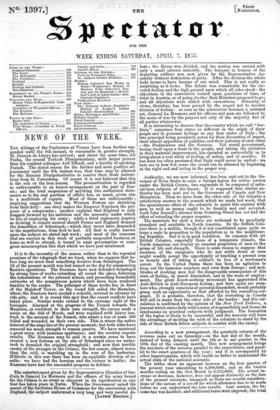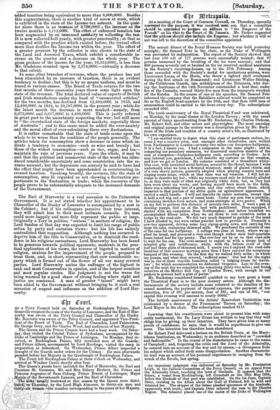According to a new arrangement, the quarterly returns of the
revenue came out on Saturday—on the last day of the month, instead of being delayed until the 5th or in one quarter to the 10th day of the ensuing month. This new arrangement brings the accounts of the revenue parallel to the experditure, and paral- lel to the exact quarters of the year ; and it is accompanied by other improvements, which will enable us better to understand the actual state of the national accounts.
The tables show an apparent increase on the first quarter of the present year amounting to 4,380,0001., and on the twelve months ending on the 31st March to 6,312,000/. The actual in- crease or decrease, however, does not appear distinctly on the face of the present accounts, inasmuch as there are several considera- tions of the nature of a set-off for which allowance has to be made before we can understand the true results. Last session, the In- come-tax WO doubled; and additional taxes we imposed; tug tow added taxation being equivalent to more than 8,000,0001. Besides this augmentation, there is another kind of screw at work, which is exhibited in the state of. the Income-tax aceount. In the quar- ter alone there is an inciitase of 3,798,000/. ; the increase on the twelve months is 5,1]2,0004 The effect of enhanced taxation has been augmented by an inereased assiduity in collecting the tax. It is now collected half-yearly, with greater punctuality ; sb that' as compared with the practice which existed before, the virtual effect more than doubles the Income-tax within the year. The effect of a greater pressure by the collector is also shown in the state of the Land and Assessed Taxes, which exhibit a considerable in- crease on the quarter and a decrease on the whole year. The gross produce of the income for the year, 10,515,0001., is less then Mr. Gladstone counted upon by 2,374,0001.—virtually a decrease to that extent.
In some other branches of revenue, where the produce has not been stimulated by an increase of taxation, there is an evident tendency to decline ; but this is by no means uniform, and must be traced to various causes. The Board of Trade returns for the two first months of three successive years throw some light upon the state of the revenue. The total declared value of exports of British and Irish manufacture under the head of "enumerated articles," for the two months, has declined from 12,504,0001. in 1853, and 12,480,0001. in 1854, to 10,197,0001. in the present year ; while for the latest month the decrease is more marked—namely, from 6,672,000/. and 6,617,000/. to 4,488,0001. This is justly referred in great part to the uncertainty respecting the war; but still more to "the overstocked state of the foreign markets, especially those of Australia" ; and to this cause must be added the over-anxiety and the moral effect of over-calculating these very fluctuations. It is rather remarkable that the state of trade seems upon the whole to be worse than the condition of the people generally. The articles taken for consumption show a decrease in some which in- dicate a tendency to economize—such as wine and brandy ; but those of the widest consumption—such as rice, sugar, and tea— maintain the rate of previous years. Upon the whole, it may be
• said that the political and commercial state of the world has intro- duced considerable uncertainty and some constriction into the re- venue account; but the depression can scarcely be said to have had the effect that might have been apprehended in counteracting in- creased taxation. Speaking broadly, the revenue, like the state of consumption, may be regarded as not showing a fluctuation pro- portionate to the fluctuation in trade; while the resources of the people prove to be substantially adequate to the increased demands of the Government.



























